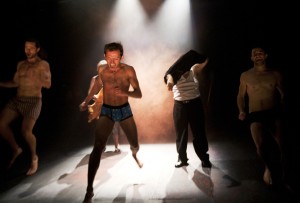Julius Caesar | New Theatre
- April 8th, 2011
- Posted in Reviews & Responses
- Write comment

I don’t see Shakespeare if I can help it. I know, I can hear you tsk tsking. There are many and varied reasons for this – some of it stems from a Barrie Kosky article I read in the SMH in the late 90s – I think it was after his Bell production of King Lear – I don’t have the article anymore (having moved countries twice in the interim). I am also going to cite Craven (yes, yes, boo hiss and all that…) http://www.smh.com.au/opinion/society-and-culture/to-thine-own-self-be-true-20100521-w0mh.html and also Colin Friels’ recent rant in the SMH http://www.smh.com.au/entertainment/theatre/friels-fires-up-20110225-1b8ar.html. For me, the main points are –
1. If given a choice between a new play and a Shakespeare – I choose the new play – because it’s new, un-chartered territory and I’m dangerous like that!
2. I believe in paying living writers and that living writers need my support more than dead ones.
3. As an avid theatre-goer (2-4 shows a week on average – I have been known to see 7-12 at Fringe festivals) If I were to see every Shakespeare i am invited to – I would spend at least half my life seeing the same play – and I find it hard to be surprised and involved in theatre that I am not chasing -if I know it all, I’m not as excited.
4. I think Shakespeare is often exciting for designers and theatre makers (actors directors etc) than it is for me as an audience member.
So, why did I see Julius Caesar at the New Theatre? A few reasons.
1. My loyalty to the creatives/crew involved – I know Mark Dessaix, Chloe Schwank, Gavin Williams and Ruth Horsall (all dedicated and passionate theatre folk) and have recently been acquainted with Mr Anthony Skuse whom I hold in very high esteem and who I like to lunch with, because he is fascinating and frank and full of delicious thoughts. And I have reviewed his work many times – I hold them in my body, in my consciousness.
2. The New Theatre has been good to me, and I like to be good to it/them.
3. I saw a version of Julius Caesar by Cry Havoc, Kate Revz’s rambunctious epic first production at the Wharf Studio – and I was curious to see how an older, male director would spin this tale.
OK – disclaimer over.
It’s a black bare stage, there’s something raw about it. It could be anywhere – a hall in Bankstown or Libya? Tight square of light – voices in the darkness and the thud of footfall as men, shirtless charge at the audience. It is a tangle of arms and legs and bodies racing lungs heaving. It’s full force – visceral. Bodies, flesh, charging.
Julius Caesar is a play about power, ambition, friendship. It’s also the flip side of that – about disloyalty and fickleness of politics. Where I think this production succeeds in the ideas of the text is we have a sense of the intimate conversations – the small moments of conversations – that are the cause of unraveling of a society and the murder of a man. In Skuse’s Julius Caesar we see the Feast of Lupercal as full of energy as the murder – these are a people of heightened superstition and compulsion to be carried away with hype – they get carried away with their thoughts, with their words, with everything so much so, the murder makes sense. But this is clearly an intimacy that the men share – Portia is left wanting: struggling with an introspective husband who wont speak to her.
And really, it’s the small scenes- the intimate scenes which I truly heard this time. No set to distract me, no lights to distract me… these speeches are about the power of language to inspire and transform and to provoke… dangerous stuff indeed.
What is impressive about the cast is their complete commitment to Skuse’s vision – unerring, present, listening. They are a well maintained and energized machine of intention and purpose – exactly what is needed for this play. The vocal work – especially the Armenian songs are sublime. The action is direct and crisp. Where some actors succeed more than others – is allowing themselves to emotionally be present – not merely intellectually – and Shakespeare can be intimidating emotionally, the language can get in the way and sometimes the actor can get in the way of the language – it’s a fine craft.
What I liked about this production was the simplicity of the staging. Skuse’s placement of bodies on stage is magnificent – especially on a stage with the depth of the New Theatre. I liked the theatrical devises offered to solve problems of blood and the maneuvering of dead men. I liked the light (Matt Cox) – the central square of light that reflected the onlooking faces of the ensemble. I liked that there was a huge cast (16 of them) and that all of them took their place with confidence and commitment, even in the face of the TEXTGENERATION who keep giggling and tweeting throughout the show (at least the one I attended.)
This was interesting – and I’m sure with only 2 Julius Caesars under my belt (at the age of 31) I’m sure there are at least another 40 I’ll be asked to see, but only another 4 I will attend – and I am glad that Skuse’s production will be amongst that exclusive group of Caesars.
Gus,
quite simply, Thank you for this reflection on our piece. I too am often wary of interpretations of Shakespeare. I gave myself to this piece purely on the basis that I trusted Anthony Skuse to craft, and allow us also to craft, something quite striking and visceral.
See you round the traps or on the train.
Mark James.